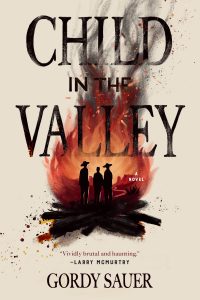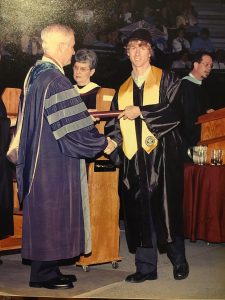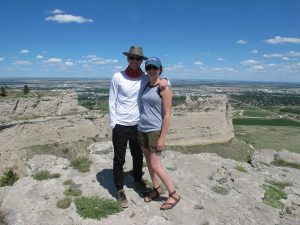On the Trail to Success
Former student Gordy Sauer ‘05, shares the story behind his debut novel “Child in the Valley'' and how his Aggie experience shaped his writing career.

By Mia Mercer ‘23
Imagine you are a young boy living in the United States in 1849. Wanting to escape your late foster father’s debt, you travel to Independence, Missouri, where you decide to join a party hoping to make it rich in the goldfields of California. Together, you and your party travel the California Trail, fifteen hundred miles of harsh, unforgiving territory. Unable to escape the hardships that arise on the trail, you and your party make the choice to exchange your gold pans for guns, leaving the river in favor of a life on the lam. While these events unfold and you fall victim to the unyielding west that surrounds you, you’re forced to look at yourself and consider the consequences of your choices.
While this story may seem like a brutal rendition of life in the wild west, it’s the reality for 17-year-old Joshua Gaines, the protagonist of Gordy Sauer’s ‘05 debut novel Child in the Valley.
Inspired by the history of 19th century America and influenced by the western genre, Sauer wrote Child in the Valley from a modern perspective, filling the narrative with themes focused on diversity, sexuality, and masculinity in the time of the California gold rush. As a Texas A&M University alumnus who graduated with an English degree from the College of Liberal Arts, Sauer highlights how major choices influence the trajectory of our lives for better or worse in his debut novel.
The Journey to Being Published

Inspired by the Wild West and 19th century America, Sauer wrote “Child in the Valley” in the hopes of including narratives that are often omitted from the Western genre.
Born and raised in Texas, Sauer grew fond of the western genre at an early age. Throughout his life he read tall tales and westerns, falling in love with works by Larry McMurtry, Zane Grey, and Louis L’Amour. Sauer said he was always aware of the genre’s exclusion of many perspectives and identities.
“The act of growing up with the western genre and loving the western genre was also an active education because I learned very early on that the genre had serious limitations in terms of the way it talks about American history in the west and the way it represents the west as a space for belonging,” Sauer explained. “Think about the construction of the transcontinental railroad; Chinese Americans and immigrants played such a seminal role in it and you often don’t see that portrayed even in books about the railroad and the west. So what’s really great about some of the new western novels is how much they’re opening up and working against the western mythology to really show readers a diverse west that we too often overlook in fiction.”
In addition to Sauer’s desire to diversify representation in western novels, Child in the Valley is also influenced by his interest in the rise and fall of the American union in the 19th century.
“The California gold rush was this seminal moment that really changed the shape and direction of the country,” Sauer said. “It felt like a good backbone for the story, and I think what makes the story good is how it inhabits those backbones with very specific characters and very specific experiences.”
It wasn’t until watching the History Channel that Sauer was able to take the first step in writing his debut novel.
“I watched this documentary about doctor Charles Robinson, a Boston physician in 1849 who had gone to Independence, Missouri to join a gold rush party,” Sauer shared. “But because Robinson didn’t have the money to join those parties, he offered his medical services instead. That idea of a doctor on the California Trail was to be the impetus for the novel. I started thinking about what medicine would look like on the trail, how did that conflict in terms of science and religion going on in the 19th century, and what would his experience be like being a doctor on the trail that is fundamentally horrific and very difficult on a body? Even though Joshua is not at all based on doctor Robinson, that idea of a doctor on the trail seeded the novel and I really ran with it from there.”
With the backbone and inspiration for his story in tow, Sauer ran into his biggest obstacle on his writing journey; research.
“Research was not only the biggest obstacle but also the biggest opportunity,” Sauer said. “There are a lot of ways to write a novel. I took the more realistic approach. Getting the details of the trail and the gold rush scenes took months and years of research. I actually drove the entirety of the California trail from Independence, Missouri to the goldfields of California and took panning lessons out in the American River to really get a sense of what that was like.”
The layers of research he had to wade through to write his historical novel left Sauer feeling grateful for his liberal arts education.
“It helped me conduct my research efficiently and discover and understand certain things about the 19th century that did or didn’t exist,” Sauer explained. “For instance, what existed in 1849 versus what existed in 1850. On that microscopic level, really getting the details right for 1849 and not sort of bleeding that into 1850 takes a much more nuanced approach to research that you can’t get to until you’re diving in on an elemental level.”
Writing and publishing are not easy processes, but after seven years of hard work and consistency, Sauer has officially struck gold, becoming a published author.
Before being published on Aug. 24, 2021, Sauer’s novel received raving reviews from media such as Publishers Weekly, Kirkus, and The Dallas Morning News. It was also listed as a “Most Anticipated Book of August” by Lambda Literary, a “Most Anticipated Fall Book” by LGBTQ Reads, and received early praise from James McLaughlin, LaTanya McQueen, and the late Pulitzer Prize-winner Larry McMurtry.
“Having my book reviewed by Larry McMurtry was a gift,” Sauer said. “In the western genre, he’s an icon and one of the most famous Texas writers. Really it was a moment that felt very validating because you spend a lot of time on these projects alone and then you send it out there and someone who you admire and have never met speaks about your work in that way – I mean it was just a powerful and very profound moment.”
As Child in the Valley falls into the hands of eager readers, Sauer said he is excited to see how his story can continue to be reshaped and rethought by those who bring their own experiences, perspectives, and critiques to the book. He also expressed hope that readers will see how his novel speaks to issues like sexuality, race, ethnicity, and diversity.
“A big challenge with historical fiction is that as the world continues to change and you continue to write, there’s always this wonder if what you’re writing from a ‘now moment’ for a ‘then period’ will remain relevant when or if the book is published,” Sauer shared. “I hope that ‘Child in the Valley’ feels relevant now to readers and I hope they see the ways in which a story about a kid going out to California during the gold rush speaks to some of the things that we are encountering and needing to think about today.”
Education in the Brazos Valley

Although he started out as a science major, Sauer pursued an English degree because he was always interested in the role English played in every other discipline. He is thankful for the education he received at the College of Liberal Arts and the professors who helped him become the writer he is today.
Although he originally came to Texas A&M to pursue a major in biological sciences, it wasn’t long before he switched to English.
“It kind of shocked my parents,” Sauer said. “English in particular and the humanities in general are just really exceptional foundations for thought and analysis and they offer skills that are ubiquitous no matter your chosen career path. I mean who doesn’t need to know how to think critically about complex ideas or how to synthesize complex ideas or how to write clearly and persuasively? ”
Looking back on his time as a student, Sauer recalled several professors who impacted both his college education and writing career. While Sauer fondly remembers his professors’ mentorship and guidance, his professors were proud to learn of his most recent publishing success.
One professor in particular played a peculiar part in Sauer’s education and writing success. English professor Donald Dickson’s review of Sauer’s final term paper was short, “Your writing leaves much to be desired,” it read. Sauer took this comment to heart and said he wouldn’t be the author he is today without the honest feedback he received from Dickson.
Sauer’s not the only one who remembers Dickson’s review.
“Gordy Sauer was an engaging and energetic student who enlivened class discussions, who clearly loved Milton and Paradise Lost, and who scored high marks on his exams,” Dickson shared. “But when I received his term paper, I was disappointed that the quality of the writing wasn’t up to this standard. Gifted students who often float through their college classes earning high marks sometimes need a kick in the pants to realize that good writing requires disciplined thinking, careful organizing, and much polishing—in short, great effort. I look forward to reading Gordy’s novel.”
Sauer said he is thankful for the education he received at Texas A&M as well as the opportunities and experiences that served as the starting point of his professional writing journey.
“Texas A&M is one of the leading public institutions in the U.S., it’s part of the Association of American Universities (AAU), so it’s elite in that way,” Sauer said. “It has a very strong culture rooted in tradition, but it’s also a place that’s very aware of the shifting student demographics that it needs to serve and also of the way culture and education have to continue to evolve and it continues to push forward in that way. It’s an exceptional place for any young person to come and take the next step in their life.”
Current Adventures
After graduating from Texas A&M, Sauer went on to receive a Masters in English from Clemson University and a Masters in Fine Arts from Columbia University. He then moved to Missouri where he was part of the faculty in the English department for five years. Now, he is the speechwriter for the University of Missouri president, in Mizzou’s strategic communications division.
Although he constantly faces and tackles challenges as a speechwriter, Sauer enjoys the creativity he is granted in the position.
“Higher education is a very dynamic space to work in and live in and the way that leaders of higher education institutions need to communicate to their stakeholders is constantly changing and is constantly evolving,” Sauer explained. “It has become way more digital than it used to be and there’s a lot of creativity needed to keep up with that and find new ways to engage people on interesting and informative levels.”

While enjoying the success of being a debut author. Sauer revealed that he is currently working on new projects as he continues on in his writing career.
As Sauer continues in his professional career, he said his education from Texas A&M constantly helps him grow as a speechwriter and author.
“Part of why we go to college is to learn to face things that are hard and find ways to get to success on the other side, and that success doesn’t always look like what we think it might,” Sauer said. “For instance if we go back to that anecdote when I finished my term paper for Dickson, success was not actually in the way that term paper was received. That comment at the top ‘your writing leaves much to be desired’ was not a successful reception, but success was in the fact that it helped me get to this point, however many years later. My time at Texas A&M taught me that being able to see those challenges, face those challenges and then find success on the other side even if it looked differently, was very valuable.”
While still enjoying his success as a debut author, Sauer revealed he already has other projects in the making.
“I’m working on another novel that’s going to be very different from this first one,” Sauer shared. “One thing I’m very interested in as a writer is how to bring genre elements into literary fiction, kind of bridging genres with literature. I’ve been really interested in sci-fi stuff and so I don’t know if it would have some kind of sci-fi element.”
As Sauer goes on to take the next steps in his writing career, he shares some advice for young authors trying to kick-start a writing career.
“Writing is not a mystical endeavor. It’s work,” Sauer said. “You have to be really committed to that work and do that work consistently in order to ensure that the project maintains the depth that it needs to maintain as you work on it. You have to be deliberate about sitting down and putting words on a page to really get anything done.”
